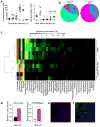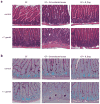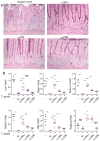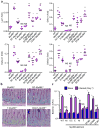Parasite-induced TH1 cells and intestinal dysbiosis cooperate in IFN-γ-dependent elimination of Paneth cells
- PMID: 23263554
- PMCID: PMC3552073
- DOI: 10.1038/ni.2508
Parasite-induced TH1 cells and intestinal dysbiosis cooperate in IFN-γ-dependent elimination of Paneth cells
Abstract
Activation of Toll-like receptors (TLRs) by pathogens triggers cytokine production and T cell activation, immune defense mechanisms that are linked to immunopathology. Here we show that IFN-γ production by CD4(+) T(H)1 cells during mucosal responses to the protozoan parasite Toxoplasma gondii resulted in dysbiosis and the elimination of Paneth cells. Paneth cell death led to loss of antimicrobial peptides and occurred in conjunction with uncontrolled expansion of the Enterobacteriaceae family of Gram-negative bacteria. The expanded intestinal bacteria were required for the parasite-induced intestinal pathology. The investigation of cell type-specific factors regulating T(H)1 polarization during T. gondii infection identified the T cell-intrinsic TLR pathway as a major regulator of IFN-γ production in CD4(+) T cells responsible for Paneth cell death, dysbiosis and intestinal immunopathology.
Figures







Comment in
-
Paneth cells: targets of friendly fire.Nat Immunol. 2013 Feb;14(2):114-6. doi: 10.1038/ni.2519. Nat Immunol. 2013. PMID: 23334825 No abstract available.
References
-
- Kawai T, Akira S. Toll-like receptors and their crosstalk with other innate receptors in infection and immunity. Immunity. 2011;34:637–650. - PubMed
-
- Gazzinelli RT, Denkers EY. Protozoan encounters with Toll-like receptor signalling pathways: implications for host parasitism. Nat Rev Immunol. 2006;6:895–906. - PubMed
Publication types
MeSH terms
Substances
Grants and funding
LinkOut - more resources
Full Text Sources
Other Literature Sources
Molecular Biology Databases
Research Materials

